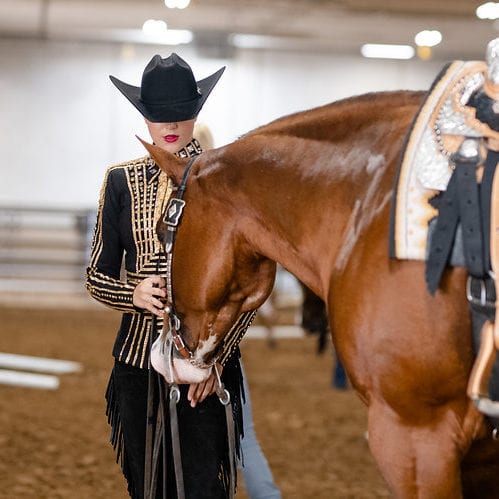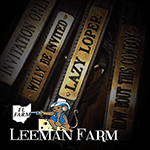For the past few years, the horse industry has been struggling, mainly due to the economy, but recently, it seems to have made an impressive comeback. There has been an increase in participation at several shows due to the increased popularity of classes like the ranch riding and leveling classes which are attracting more people to the industry.
In part 1 of this two-part series, ”We Ask the Experts: State of the Industry,” we asked people in the industry to discuss things they believe have been going right in the industry.
GoHorseShow asked breeders, judges, trainers, and exhibitors to expand on the positives changes they have seen in the industry. Read on to see what they have to say. Do you agree? Let us know.
Stay tuned for Part 2 where individuals in the industry discuss aspects of the industry that still need to be improved.
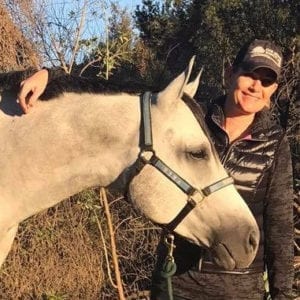 Kathryn deVries Mitchell – I feel like we are focusing on what is best for the horse as an individual. Will they all make two-year-old futurity horses? Heck no! The market supports horses of all different levels. I do feel we are also breeding healthier, more talented horses as well. The quality of young horses gets better and better every year. It’s amazing watching some of these junior trail and western riders; they’re better than most the senior horses we had ten years ago.
Kathryn deVries Mitchell – I feel like we are focusing on what is best for the horse as an individual. Will they all make two-year-old futurity horses? Heck no! The market supports horses of all different levels. I do feel we are also breeding healthier, more talented horses as well. The quality of young horses gets better and better every year. It’s amazing watching some of these junior trail and western riders; they’re better than most the senior horses we had ten years ago.
 Jane Backes – The majority of stud fees have lowered on really lovely stallions which have helped open up the market to the small breeders.
Jane Backes – The majority of stud fees have lowered on really lovely stallions which have helped open up the market to the small breeders.
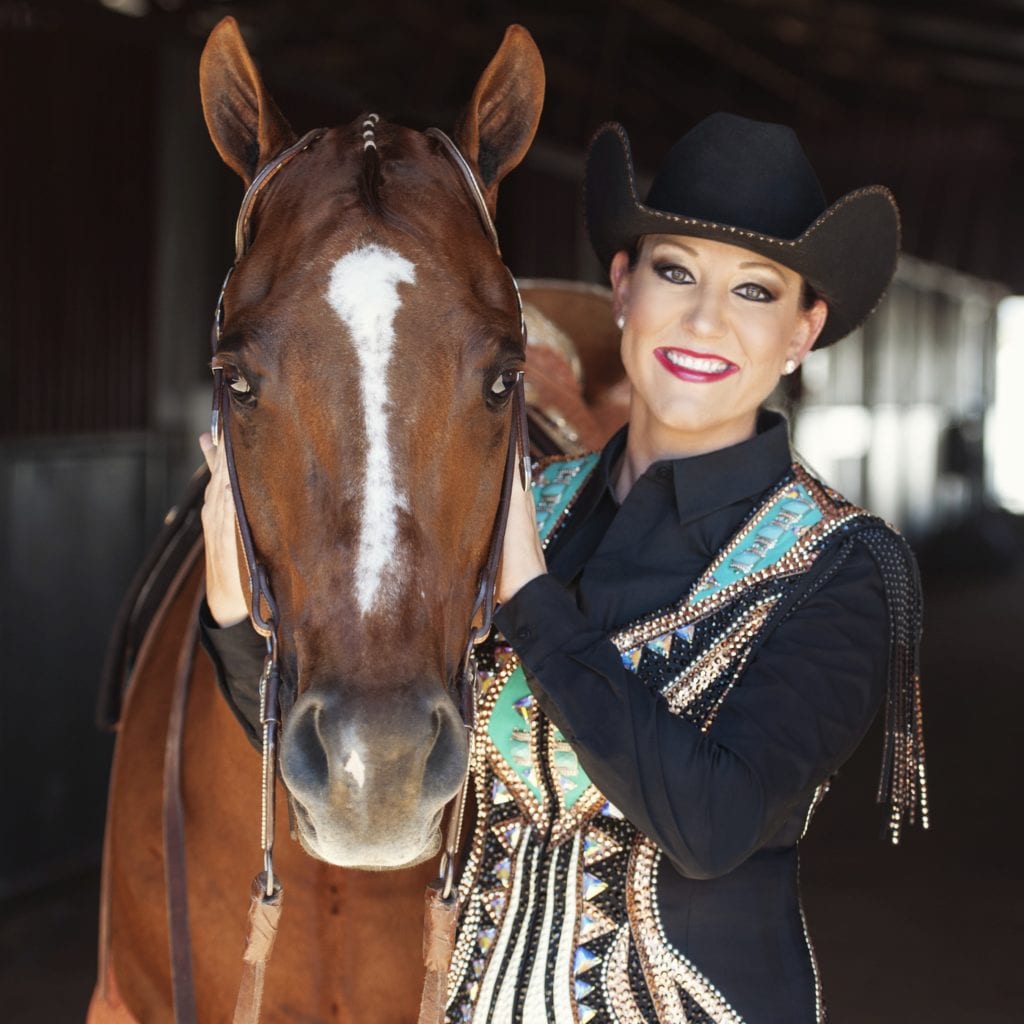 Julie Hoefling – I think the camaraderie and encouragement around the industry is something that is positive. The more I get involved in the industry, the more opportunity I have seen in it. The competition is fierce these days, but the amount of goodwill and positive comments from other exhibitors is encouraging. People are welcoming and supporting each other. There is an excellent “vibe” when you walk around the shows, and that feels good. Competition is hard enough, so it is great to see so many people being nice to each other.
Julie Hoefling – I think the camaraderie and encouragement around the industry is something that is positive. The more I get involved in the industry, the more opportunity I have seen in it. The competition is fierce these days, but the amount of goodwill and positive comments from other exhibitors is encouraging. People are welcoming and supporting each other. There is an excellent “vibe” when you walk around the shows, and that feels good. Competition is hard enough, so it is great to see so many people being nice to each other.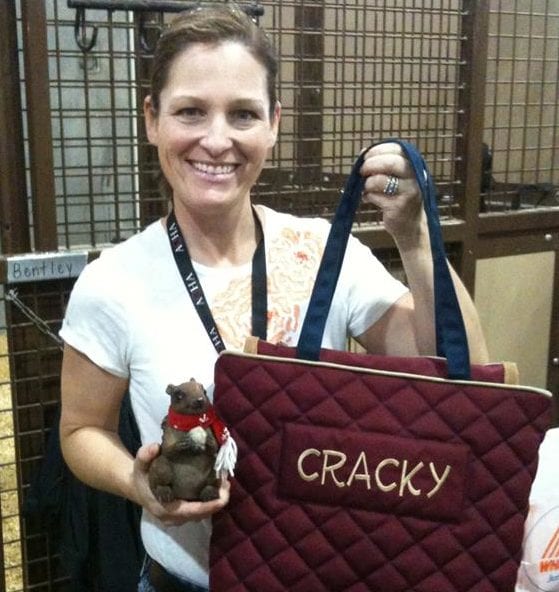 Lainie DeBoer – Things going right include the American Quarter Horse internationally. This impact could turn around membership and registrations. Not only is our American Quarter Horse being discovered worldwide, but it’s showing how genuinely versatile our breed is. I know many trainers, like myself that are getting opportunities abroad to give clinics and judge horse shows. This is an inspiring time for our breed, and Anna Morrison at AQHA has been doing an incredible job promoting the International department at AQHA.
Lainie DeBoer – Things going right include the American Quarter Horse internationally. This impact could turn around membership and registrations. Not only is our American Quarter Horse being discovered worldwide, but it’s showing how genuinely versatile our breed is. I know many trainers, like myself that are getting opportunities abroad to give clinics and judge horse shows. This is an inspiring time for our breed, and Anna Morrison at AQHA has been doing an incredible job promoting the International department at AQHA.
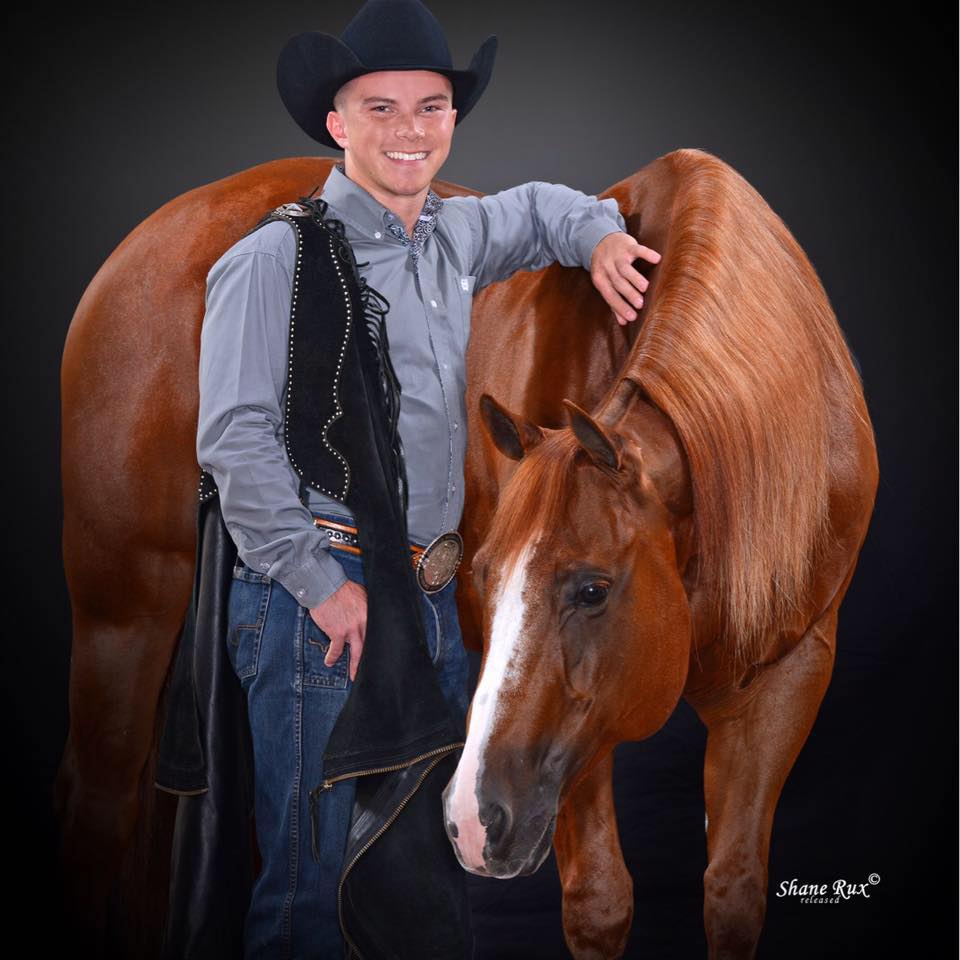 Mark Mowbray – One of the best things that our industry has to offer is youth development. The programs and amenities that are available for our youth in the Quarter Horse industry are remarkable. We offer a multitude of programs that not only benefit our horse owning members but our non-horse owning members as well. Between scholarships, leadership growth opportunities, shows, developmental programs and collegiate competition (IHSA and NCEA), the future of our industry is bright in my opinion.
Mark Mowbray – One of the best things that our industry has to offer is youth development. The programs and amenities that are available for our youth in the Quarter Horse industry are remarkable. We offer a multitude of programs that not only benefit our horse owning members but our non-horse owning members as well. Between scholarships, leadership growth opportunities, shows, developmental programs and collegiate competition (IHSA and NCEA), the future of our industry is bright in my opinion.
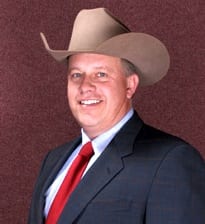 Wayne Halvorson – I believe that the resurgence of the halter futurities has helped the halter industry. The payouts at the Breeders’ Halter Futurity in Iowa and moving WCHA’s main halter futurity to Fort Worth during the Paint World has helped. Also, the East and West Coast Halter Futurities have been growing. The $450,000 added to the halter classes by Linda Gordon, Terry Bradshaw, and The Headley Family has also been a huge plus.
Wayne Halvorson – I believe that the resurgence of the halter futurities has helped the halter industry. The payouts at the Breeders’ Halter Futurity in Iowa and moving WCHA’s main halter futurity to Fort Worth during the Paint World has helped. Also, the East and West Coast Halter Futurities have been growing. The $450,000 added to the halter classes by Linda Gordon, Terry Bradshaw, and The Headley Family has also been a huge plus.
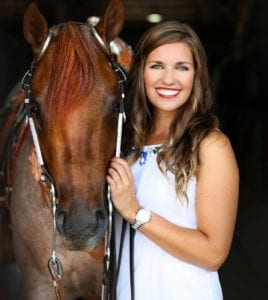 Lauren Stanley – Horse show management and sponsors have been doing a fantastic job of offering money added classes in the all-around events. We recently attended the Show For Dough in Georgia and had so much fun competing for more than just points. It was so nice to have the opportunity to win your entry fee back, and maybe even a little more. It’s great to see trail futurities as well. It offers owners a chance to showcase their talented horses that maybe didn’t love the pleasure pen.
Lauren Stanley – Horse show management and sponsors have been doing a fantastic job of offering money added classes in the all-around events. We recently attended the Show For Dough in Georgia and had so much fun competing for more than just points. It was so nice to have the opportunity to win your entry fee back, and maybe even a little more. It’s great to see trail futurities as well. It offers owners a chance to showcase their talented horses that maybe didn’t love the pleasure pen.
Another trend that I love recently is the fun activities that show management is offering. I love how Sun Circuit and The Fall Championships have prize carts and random races for things like iPads and TVs. They do a great job having lunch or dinner parties as well, which brings exhibitors together.
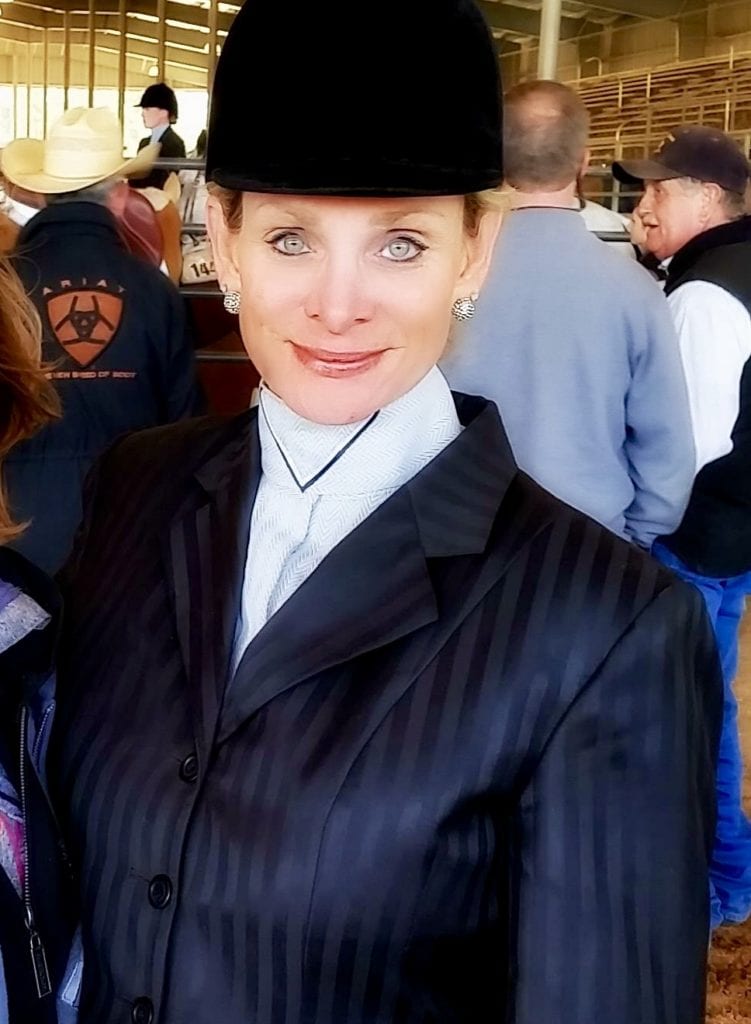 Angie Proctor-Reichert – The horse show industry has made many positive changes in the recent years. AQHA has been a large part of that in numerous areas. These changes keep the association moving forward. For example, the forward motion in all classes, but especially the controversial western pleasure, makes the classes nice to watch. Several new tack/training rules have helped keep training on a more level playing field. The Leveled classes help the exhibitors show against others who are closer to equal in their riding abilities, and the same goes for the leveling per horse. The Rookie classes are a tremendous asset for the novice riders just coming into Quarter Horse or someone who has been showing for years but wants to start a new discipline. These people now have options for more chances at a trophy. The real recent rule of Performance Halter horses being shown at the world shows are now required to (1) show at the World show in at least one performance class and (2) they must have a performance ROM in the qualifying period. This puts the Performance Halter outcome closer to its original intention, so lots of nice changes.
Angie Proctor-Reichert – The horse show industry has made many positive changes in the recent years. AQHA has been a large part of that in numerous areas. These changes keep the association moving forward. For example, the forward motion in all classes, but especially the controversial western pleasure, makes the classes nice to watch. Several new tack/training rules have helped keep training on a more level playing field. The Leveled classes help the exhibitors show against others who are closer to equal in their riding abilities, and the same goes for the leveling per horse. The Rookie classes are a tremendous asset for the novice riders just coming into Quarter Horse or someone who has been showing for years but wants to start a new discipline. These people now have options for more chances at a trophy. The real recent rule of Performance Halter horses being shown at the world shows are now required to (1) show at the World show in at least one performance class and (2) they must have a performance ROM in the qualifying period. This puts the Performance Halter outcome closer to its original intention, so lots of nice changes.
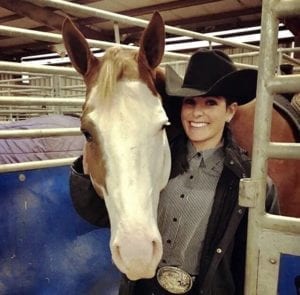 Erica Greathouse – One of the most positive things in the industry these days is how breeding programs are evolving. The horses are more talented and suited for their intended jobs than ever before. They have a head start before they have even had a saddle on and the breeding advancements have indeed made the show arena much more competitive and fun to watch. I think the style of western pleasure, hunter under saddle and halter horses are all evolving in very positive ways.
Erica Greathouse – One of the most positive things in the industry these days is how breeding programs are evolving. The horses are more talented and suited for their intended jobs than ever before. They have a head start before they have even had a saddle on and the breeding advancements have indeed made the show arena much more competitive and fun to watch. I think the style of western pleasure, hunter under saddle and halter horses are all evolving in very positive ways.
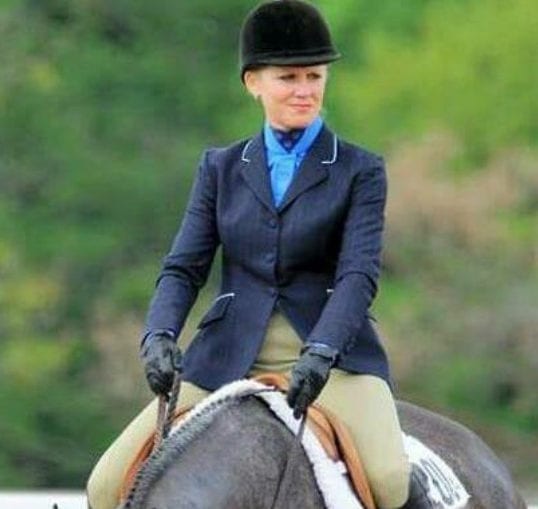 Missy Thyfault – I love the Level 2 addition to classes – great idea across the board. I think the addition of the 13 and under to the AQHYA World Show is a great thing to encourage our younger members and give them a chance to compete at the World Show Level. I also love the Level 1 Championship Shows.
Missy Thyfault – I love the Level 2 addition to classes – great idea across the board. I think the addition of the 13 and under to the AQHYA World Show is a great thing to encourage our younger members and give them a chance to compete at the World Show Level. I also love the Level 1 Championship Shows.
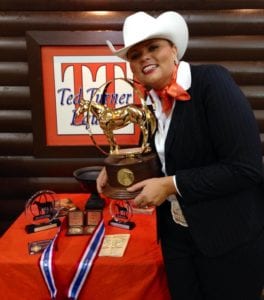 Amanda Wallinger-Rowan – I think the shows are working more with the amateur halter exhibitors to get more numbers in their classes. I have felt a more positive vibe regarding the halter industry lately. I think people are starting to believe in it again and that has a lot to do with the money given by Linda Gordon and Terry Bradshaw and also the large payouts at the futurities. Before, we would only win a few hundred dollars which wasn’t much motivation to show. Now, shows have five or more classes that I can show my one halter horse in, and that’s also a huge incentive to go to the futurities.
Amanda Wallinger-Rowan – I think the shows are working more with the amateur halter exhibitors to get more numbers in their classes. I have felt a more positive vibe regarding the halter industry lately. I think people are starting to believe in it again and that has a lot to do with the money given by Linda Gordon and Terry Bradshaw and also the large payouts at the futurities. Before, we would only win a few hundred dollars which wasn’t much motivation to show. Now, shows have five or more classes that I can show my one halter horse in, and that’s also a huge incentive to go to the futurities.
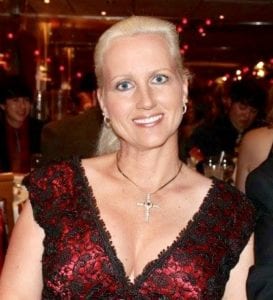 Leigh Ann Griffith – The continued emergence of middle and high school national programs like YEDA and IEA, as well as IHSA at the collegiate level, is one of the brightest spots in the horse industry today. Additionally, the prominence and prestige of the Level 1 Championship events are very exciting. The fact that new riders can come into the industry without the expense and necessity of horse ownership, and actually can become competitive for college scholarships is genuinely invigorating for students that we see through our riding academy. Keeping the whole “leveling” mentality in mind, I feel that the “dress down” trend in both clothing and equipment is a refreshing opportunity for many who cannot afford a $6,500 show shirt, or $15,000 saddle. To me, ranch riding has played a significant role in developing the climate of the industry through its simplicity. I think that is where a lot of the fashion and style has been dictated.
Leigh Ann Griffith – The continued emergence of middle and high school national programs like YEDA and IEA, as well as IHSA at the collegiate level, is one of the brightest spots in the horse industry today. Additionally, the prominence and prestige of the Level 1 Championship events are very exciting. The fact that new riders can come into the industry without the expense and necessity of horse ownership, and actually can become competitive for college scholarships is genuinely invigorating for students that we see through our riding academy. Keeping the whole “leveling” mentality in mind, I feel that the “dress down” trend in both clothing and equipment is a refreshing opportunity for many who cannot afford a $6,500 show shirt, or $15,000 saddle. To me, ranch riding has played a significant role in developing the climate of the industry through its simplicity. I think that is where a lot of the fashion and style has been dictated.
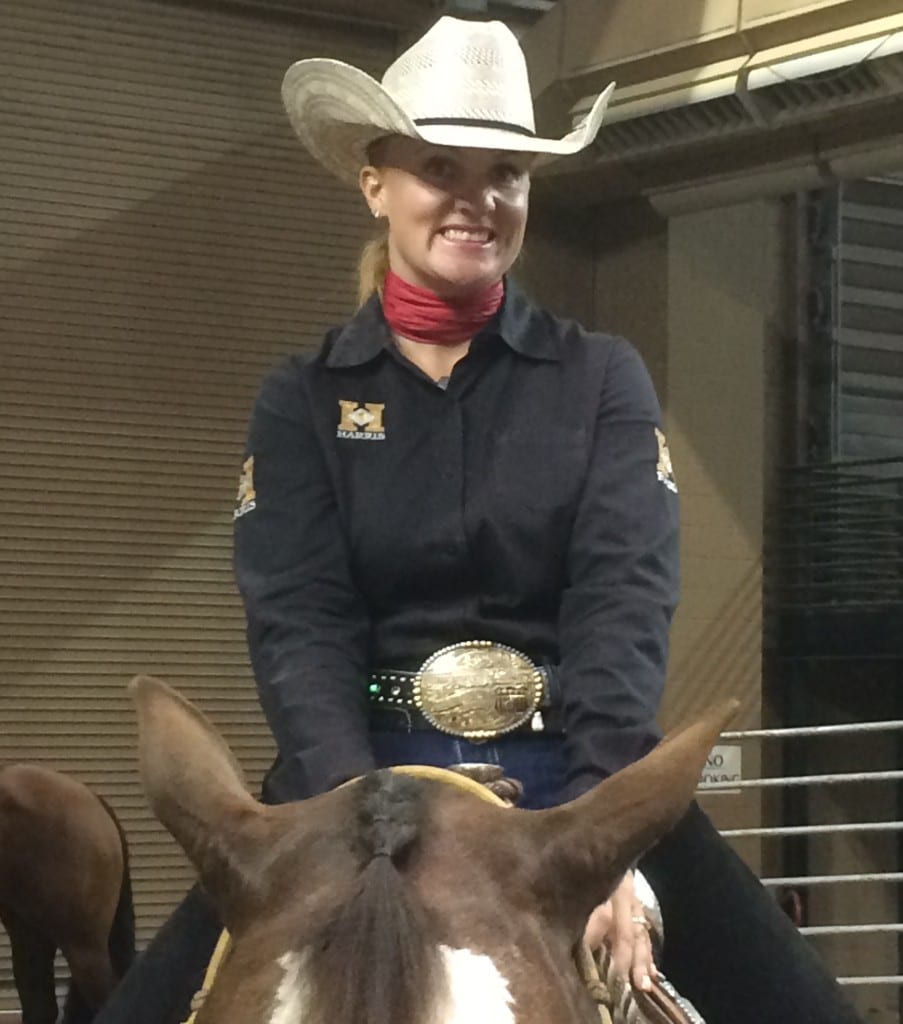 Katy Jo Zuidema – Western pleasure horses are starting to go forward and be rewarded for showing off the rail.
Katy Jo Zuidema – Western pleasure horses are starting to go forward and be rewarded for showing off the rail.
Horses are selling again. It’s nice to see the whole industry take a deep breath and start to make ends meet without struggling.
Horse shows are coming back. It’s been a long time since I’ve heard about a show that is dying.
 Elizabeth “Spike” Brewer – The first thing that I think is working within the industry is the Rookie program that AQHA offers. This is an excellent way to get the folks who have been focusing on 4H and Open Shows and giving them the courage to step up their game and start showing some breed shows. Another option that I am a big fan of is the Level 1 World Championships that AQHA offers. These shows seem to have large exhibitor entry numbers and seem to draw the folks who may have started in the Rookie program and worked their way up.
Elizabeth “Spike” Brewer – The first thing that I think is working within the industry is the Rookie program that AQHA offers. This is an excellent way to get the folks who have been focusing on 4H and Open Shows and giving them the courage to step up their game and start showing some breed shows. Another option that I am a big fan of is the Level 1 World Championships that AQHA offers. These shows seem to have large exhibitor entry numbers and seem to draw the folks who may have started in the Rookie program and worked their way up.
Being someone who truly enjoys the futurity age hunter under saddle and western pleasure prospects, the few shows that offer “big” money payouts with a green or maiden horse class seem to be very popular. This idea has trickled down into the trail and other scored events as well so it seems to be catching on. It’s nice to see folks have a chance to win some money back to offset their investment.
Speaking more on the APHA shows specifically – it seems that many clubs/groups are opting for shorter shows to help trim some of the costs to help keep the show profitable. This idea seems to be going well overall, and I think show management should look at this as an option. Many exhibitors have a hard time getting multiple days of work in a row, added expenses for shows that are five to six days long and end up being almost ten days with travel time. I strongly urge clubs to evaluate if their show could run in a shorter number of days format to make them more advantageous for show management’s bottom line and the exhibitors.
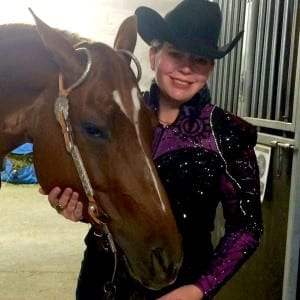 Hilary Reinhard – I’m the third generation of my family that has been involved in AQHA. My grandparents raised quarter horses 50 years ago, and my mom and I still compete today. A lot has changed over the years. I think owners, in general, are much more concerned with the well being of the horses. Twenty years ago, I never heard of anyone turning someone in for abuse at a show, even though I remember instances that, in hindsight, should have been. Now, it’s a lot more common.
Hilary Reinhard – I’m the third generation of my family that has been involved in AQHA. My grandparents raised quarter horses 50 years ago, and my mom and I still compete today. A lot has changed over the years. I think owners, in general, are much more concerned with the well being of the horses. Twenty years ago, I never heard of anyone turning someone in for abuse at a show, even though I remember instances that, in hindsight, should have been. Now, it’s a lot more common.
Our horses are more specialized, but also more talented and better minded. The depth of talent at even the smaller shows is impressive.
The training has gotten a lot more advanced and sophisticated. The days where we just went in the arena on a full drape and prayed our horses stayed good are over. Now, we have a lot more tools we can use.
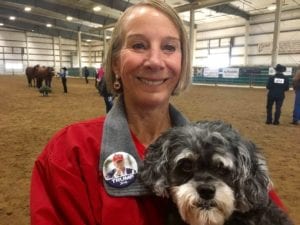 Debby Brehm – I see some real progress in the attempts of AQHA and NSBA to try to be more inclusive at their horse shows. NSBA has had much success with their Heroes on Horseback program as well as their EWD classes. Both programs are well received not only by the riders but by the audience as well. AQHA has worked very hard to be more inclusive by continually improving their Leveling program. I am a total believer in the different levels as both my daughter Morgan, and I have progressed through the use of this program. If you check the Level 1 Championships, you will see huge classes as people are trying their hand at showing at AQHA shows. The same is true at every AQHA show. Level 1 works.
Debby Brehm – I see some real progress in the attempts of AQHA and NSBA to try to be more inclusive at their horse shows. NSBA has had much success with their Heroes on Horseback program as well as their EWD classes. Both programs are well received not only by the riders but by the audience as well. AQHA has worked very hard to be more inclusive by continually improving their Leveling program. I am a total believer in the different levels as both my daughter Morgan, and I have progressed through the use of this program. If you check the Level 1 Championships, you will see huge classes as people are trying their hand at showing at AQHA shows. The same is true at every AQHA show. Level 1 works.
I also see positives in the halter industry due to the WCHA (World Conformation Horse Association) and the direction it’s headed. The WCHA hosts futurities in various parts of the country and people have a chance to win some nice money, whether you are first or 15th. I don’t think people object to high entries etc if they feel they have a chance to win it back. Classes are being offered for non-pros, youth, different ages of horses, etc and all of this creates excitement and interest. Performance halter is quite large and this is a positive because people want to ride their horses too while still showing at halter.
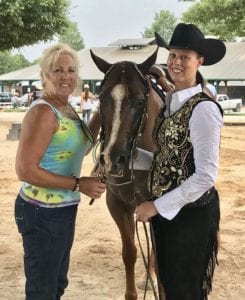 Adrienne Cober Dickerson – The quality of horses has never been better, from western pleasure to the all-around.
Adrienne Cober Dickerson – The quality of horses has never been better, from western pleasure to the all-around.
Kids get great scholarships to excellent schools for doing well at this sport, so if you’re lucky, you can get a return on investment.
The leveling has made it a better way in for newcomers. However, there is still a lot of room for improvement.
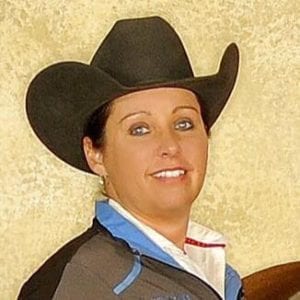 Heather Young – I feel our industry has dramatically improved the caliber of patterns and have increased the degree of difficulty to suit today’s horses and riders. Our horses and riders are outstanding, and it is imperative to have patterns that will test their skills.
Heather Young – I feel our industry has dramatically improved the caliber of patterns and have increased the degree of difficulty to suit today’s horses and riders. Our horses and riders are outstanding, and it is imperative to have patterns that will test their skills.
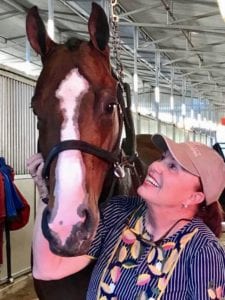 Kimberly Lloyd Wright – I haven’t participated much lately, but I have noticed that with the economy being a lot better, there is a higher number of exhibitors participating in horse shows and other equine events. The ranch riding has exploded with participation because AQHA has made this event for anyone who has a Quarter Horse to compete.
Kimberly Lloyd Wright – I haven’t participated much lately, but I have noticed that with the economy being a lot better, there is a higher number of exhibitors participating in horse shows and other equine events. The ranch riding has exploded with participation because AQHA has made this event for anyone who has a Quarter Horse to compete.
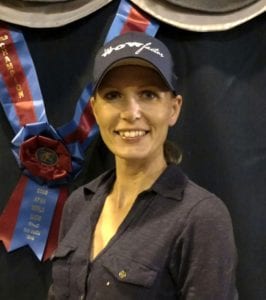 Nicole Dalton – A positive of the industry is the overall quality of the horses keeps getting better. We’re breeding to do their jobs naturally. I’m seeing so much natural raw talent in foals more and more each year.
Nicole Dalton – A positive of the industry is the overall quality of the horses keeps getting better. We’re breeding to do their jobs naturally. I’m seeing so much natural raw talent in foals more and more each year.
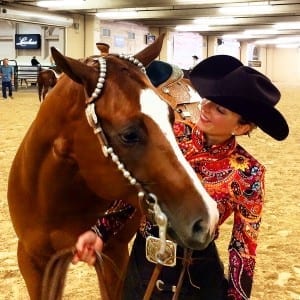 Lena Sailor Berry – As someone who didn’t grow up showing AQHA, only dreaming of it, I would say one of the most significant values I see our association doing is focusing on participation and stepping stones. I bought a horse five years ago to show in Rookie and Novice classes at our local shows. Year one, I was excited for year two. When I went to the Level 1 Championship two years later, the experience of a “world show” brought tears to my eyes, and I knew life would never be the same. All of those experiences helped build my confidence, and Arnold’s (her horse). We needed those moments to get us hooked and keep us coming back for more and so does almost everyone. Don’t think any award is too small or any recognition too insignificant. They might mean the world to someone. And that someone might turn into someone who spends the rest of their life supporting this industry.
Lena Sailor Berry – As someone who didn’t grow up showing AQHA, only dreaming of it, I would say one of the most significant values I see our association doing is focusing on participation and stepping stones. I bought a horse five years ago to show in Rookie and Novice classes at our local shows. Year one, I was excited for year two. When I went to the Level 1 Championship two years later, the experience of a “world show” brought tears to my eyes, and I knew life would never be the same. All of those experiences helped build my confidence, and Arnold’s (her horse). We needed those moments to get us hooked and keep us coming back for more and so does almost everyone. Don’t think any award is too small or any recognition too insignificant. They might mean the world to someone. And that someone might turn into someone who spends the rest of their life supporting this industry.
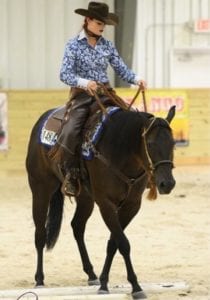 Jessica Braswell – One thing I feel is going very right is that trainers and breeders have developed horses that are better designed to do the event we ask them to do. In turn, it results in healthier and happier horses, customers and trainers.
Jessica Braswell – One thing I feel is going very right is that trainers and breeders have developed horses that are better designed to do the event we ask them to do. In turn, it results in healthier and happier horses, customers and trainers.
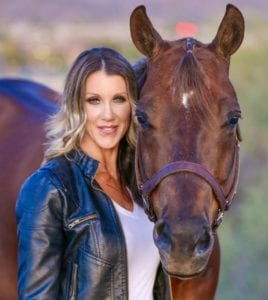 Amy Groefsema – I think the leveling system is one of the best ideas because it helps to buffer the leap from novice to the big league. For me, “pointing out” was both exciting and nerve-wracking but knowing that I was in similar company was nice.
Amy Groefsema – I think the leveling system is one of the best ideas because it helps to buffer the leap from novice to the big league. For me, “pointing out” was both exciting and nerve-wracking but knowing that I was in similar company was nice.
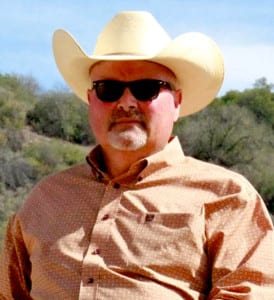 Michael Damianos – I think Leveling and the Level One Championships has been an excellent program for the amateur horse show business. Adults that entered the horse show scene later in life and adults returning after a long hiatus can find a place that fits their confidence and skill set without being overwhelmed or overly discouraged. There are multiple Level 1 Championship classes distributed throughout the country, so exhibitors don’t have to travel so far.
Michael Damianos – I think Leveling and the Level One Championships has been an excellent program for the amateur horse show business. Adults that entered the horse show scene later in life and adults returning after a long hiatus can find a place that fits their confidence and skill set without being overwhelmed or overly discouraged. There are multiple Level 1 Championship classes distributed throughout the country, so exhibitors don’t have to travel so far.
Ranch Riding has been fantastic. People can have fun without feeling frustrated with an abundance of technicalities. Even if they blow the pattern, they can still get a score. They have also seen excellence develop in this division that gives them a standard to strive for.
The internet has made information so accessible. Breed websites, social media, and business websites have made it easier to learn about our sport and keep abreast of what is going on.
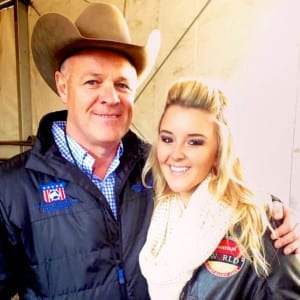 Randy Jacobs – I believe futurities like the Breeders’ Halter Futurity and the Elite Halter Futurity at the Congress have been very beneficial to our industry. WCHA is doing good things such as moving their main futurity to Fort Worth. The soundness and conformation of the horses have also improved. I believe the Performance Halter classes have also helped the industry, and I’m glad to see they have changed the rules where a true-all around horse can be competitive in the class.
Randy Jacobs – I believe futurities like the Breeders’ Halter Futurity and the Elite Halter Futurity at the Congress have been very beneficial to our industry. WCHA is doing good things such as moving their main futurity to Fort Worth. The soundness and conformation of the horses have also improved. I believe the Performance Halter classes have also helped the industry, and I’m glad to see they have changed the rules where a true-all around horse can be competitive in the class.
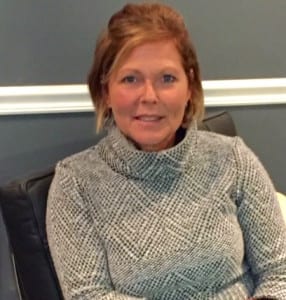 Debbi Trubee – The best side of the horse industry is when there is a tragedy or need for one of our own. The generosity, sympathy, and outpouring of support shown to those either in need or for a family that has lost a loved one, is always heartwarming and cements our feeling of family.
Debbi Trubee – The best side of the horse industry is when there is a tragedy or need for one of our own. The generosity, sympathy, and outpouring of support shown to those either in need or for a family that has lost a loved one, is always heartwarming and cements our feeling of family.
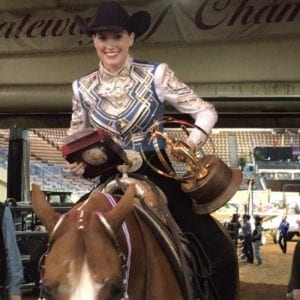 Hillary Roberts – Sometimes I feel like a broken record because this isn’t the first time I’ve said this when asked similar questions. Each year the summer futurities come around, and each year I’m impressed by the overall quality of western pleasure and hunt seat horses today. I think our industry is inundated with talented horses and talented people.
Hillary Roberts – Sometimes I feel like a broken record because this isn’t the first time I’ve said this when asked similar questions. Each year the summer futurities come around, and each year I’m impressed by the overall quality of western pleasure and hunt seat horses today. I think our industry is inundated with talented horses and talented people.
What do you think is a positive aspect of the industry? Let us know.
Stay tuned for Part 2 of this series where people discuss improvements they would like to see in the industry.


